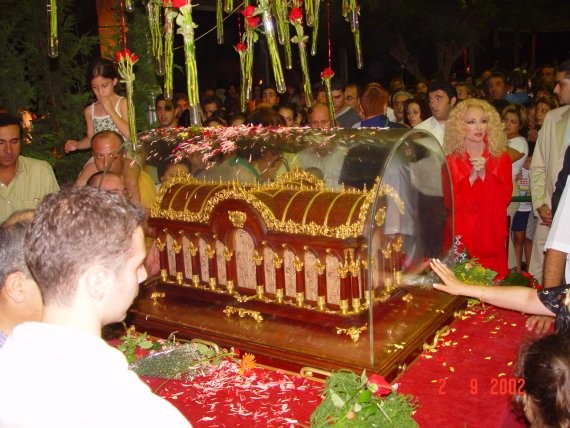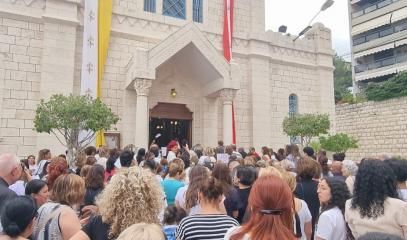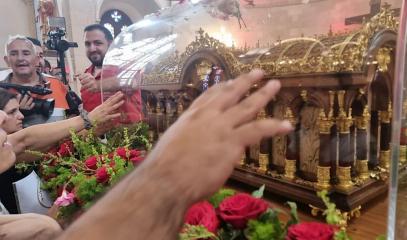The relics of Saint Therese of Lisieux on a peace mission in Lebanon at a time of war
The relics arrived on 13 June, the day war broke out between Iran and Israel, and are travelling through a country that is recovering from the war between Hezbollah and the Jewish state. A stop in the tormented south is planned. They are a precious seed according to the nuncio, Archbishop Borgia, and encourage “the faithful to undertake the same path to holiness,” says Lazarist clergyman.
Beirut (AsiaNews) – Lebanese Christian towns and villages are currently celebrating the relics of Saint Thérèse of Lisieux, which are on a mission of peace and intercession in a region bereaved by war.
Unpredictably, and to the surprise of those who were going to the airport to welcome them, war between Iran and Israel broke out on the very day of their arrival, Friday, 13 June.
Accompanied by Father Olivier Ruffray, former rector of the Lisieux shrine, and followed daily by two of the country's major television stations, the procession of the relics is a daily Palm Sunday celebration.
"Saint Thérèse was welcomed like a personality; personally, I felt her alive, as if she were there in person," said Suzanne A., an economics student who was at the relics' procession at Notre-Dame Church in Jounieh.
For the organising committee, chaired by Father Michel Abboud, president of Caritas Lebanon, despite certain excesses, mainly due to the sometimes hasty procession of schoolchildren and visitors before the reliquary, this form of popular piety stands up to criticism, being firmly anchored in Church doctrine.
“Normally, it takes between one and two years for a request to be received,” said businessman Fady Fayad, a member of the Jounieh municipal council, the only lay member of the organising committee. “But we benefited from the cancellation of one of the planned visits, and the coincidence of their arrival in Lebanon and the Israel-Iran war was purely coincidental.”
For Vincentian priest Fr Ramzi Jreige, visiting from the Vincentian Fathers' Eastern Province, “catechesis must accompany the journey of the relics, so that they may be an encouragement for the faithful to undertake the same path to holiness.”
“To ensure that visiting these relics is not like visiting a museum, and that touching the reliquary window is not a purely mechanical and superstitious gesture, the conditions for a personal encounter with Christ must be created,” he explained.
This is also what the Apostolic Nuncio, Archbishop Paolo Borgia, thinks. "It's a good initiative," assured the Holy See's ambassador to Lebanon. "But it's a matter of sowing seeds.”
“The important thing is to take Thérèse of Lisieux as a model. There is nothing extraordinary in her life. Her greatness lies in the love of God, according to the words of Our Lord: “unless a grain of wheat falls to the ground and dies, it remains just a grain of wheat; but if it dies, it produces much fruit.”
The nuncio is not bothered by the exuberant welcome given to the relics, with rose petals, handfuls of rice, swirls of incense, hymns, and chimes. "She is well received," he says. "I myself am sometimes welcomed like that. It's the joy of receiving, the sense of Eastern hospitality."
At the Nunciature
Archbishop Borgia confirmed with Father Abboud that the relics will make an unscheduled stop at the Nunciature on 9 July. “But it's the least we can do," he stressed. “The relics must stop at the Holy Father's House. It will be a short one-hour visit, the time for a Mass attended by the Sisters."
That said, what explains Thérèse of Lisieux’s great popularity in Lebanon and around the world? What drives so many Lebanese families to give her name to their daughters?
According to Fady Fayad, the Maronite Church has forged close ties with this great saint. Lebanon can claim that it had the first convent outside France bearing her name in 1927, in Sehaileh (Keserwan).
In 2016, Patriarch Bechara al-Rahi inaugurated a Chapel of Lebanon in Lisieux. Moreover, this was the second visit of the relics of "Little Thérèse" to Lebanon, after that of 2001, which many still remember with wonder.
The "Little Way"
Why did John Paul II decide in 1997 to award her the title of "Doctor of the Church"? Thérèse never pursued studies. The "doctrine" that earned her this title does not exist in any treatise. It was her conduct, and the sincerity of her "little way" of surrendering and trusting that earned Thérèse of Lisieux her great title.
By negotiating graces with God, Thérèse managed to buy much with very little; by giving great value to the suffering of very small acts, she obtained an immense return on her investment. Any housewife familiar with the exhaustion that housework can cause will tell you the same thing.
For Thérèse often fell asleep during her hours of prayer and had the greatest difficulty reciting the rosary. Her perfection lay elsewhere. She was given to a heroic and continual offering of love in ordinary tasks, the refectory, the laundry, ironing, and communal prayers.
After dying of tuberculosis at the age of 24, the Saint achieved what she had promised herself, while still alive: "to spend her heaven doing good on earth." And this "good," before being the granting of a miracle, consists of instiling in the faithful the desire to love God until their last breath, for we do not always know by what hidden paths faith travels in hearts. But miracles are always possible.
According to Fady Fayad, a single woman diagnosed with stomach cancer claimed a few days ago that she had been miraculously cured by the saint.
One must read Thérèse of Lisieux. Her "Complete Works" are in bookstores. Her masterpiece, "Story of a Soul," retitled "Autobiographical Manuscripts," is available in paperback and surprisingly easy to read.
“These pages show the supernatural wisdom of the author," said John Paul II. Translated into some thirty languages and selling 600 million copies, this book has become one of the world's greatest “classics”.
The pilgrimage of her relics in Lebanon will end on 20 July; until then they will be in South Lebanon for a few days, a key region in a conflict that is struggling to find a solution.









.png)










